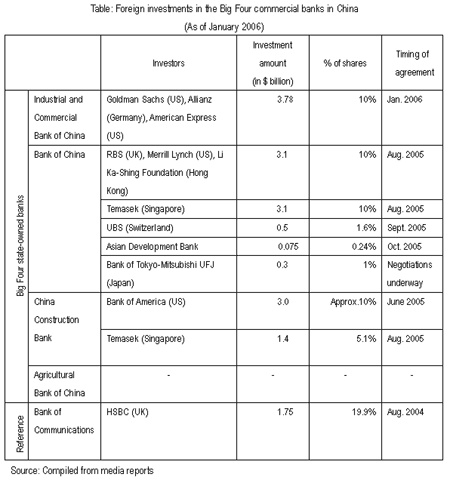In a bid to give a powerful push to its bank reform, China is pursuing a plan to turn the Big Four state-owned commercial banks into joint-stock companies and eventually list them on foreign stock exchanges. As part of this endeavor, China has been trying to invite strategic investors from overseas to help improve the managerial efficiency of the state-owned banks. Meanwhile, foreign financial institutions are also keen to enter the Chinese market through a capital tie-up with local banks, hence, a spate of investments in the Big Four.
Specifically, in June 2005, the Bank of America announced its plan to invest $3 billion in the China Construction Bank (CCB) thereby acquiring about a 10% stake in it. Subsequently, the Royal Bank of Scotland announced that it, together with Merrill Lynch and Li Ka-Shing, a Hong Kong business tycoon, would acquire a 10% stake in the Bank of China (BOC) for $3.1 billion. Furthermore, Goldman Sachs and American Express of the United States and Allianz of Germany announced that they would jointly invest $3.78 billion in the Industrial and Commercial Bank of China (ICBC) for a 10% stake. Among Japanese banks, the Bank of Tokyo-Mitsubishi UFJ announced in January this year, shortly after it was established by a merger, that it has been negotiating with the Chinese authorities over its capital participation in the BOC.
While the need to introduce foreign capital into the state-owned banks is widely recognized, critics are querying whether shares of these banks are not being sold too cheaply in this process. As grounds for such "underselling" arguments, they refer to the fact that the prices of state-owned bank shares charged to foreign investors are far below what should be based on the earnings of these banks. For instance, the ICBC's operating profit in 2004 amounted to 74.7 billion yuan, which translates into some $9 billion based on the current foreign exchange rate. This means that a foreign financial institution acquiring a 10% stake in ICBC for $3 billion would be able to recover the cost of investment within four years. The rate of return would be even greater for foreign investors, considering an expected rise in share prices subsequent to the listing of ICBC. In addition, the government has injected a massive amount of public funds into the Big Four banks to help them dispose of non-performing loans and rev up their capital bases. With that taken into account, critics say that underselling state-owned bank shares to foreign investors is tantamount to a drain on state-owned assets. Furthermore, it has been pointed out that the exclusion of Chinese investors from a chance to bid violates the principle of equal footing, a key premise of market economy.
To these, the following counterarguments have been made by government authorities and economists. First, the purpose of accepting capital from strategic investors is to absorb managerial expertise from these investors so as to improve banks' global competitiveness and therefore it inevitable to give priority to foreign financial institutions that are superior to their Chinese counterparts in terms of both technology and experience. Second, from the potential investors' perspective, there are significant risks involved in taking a stake in a Chinese state-owned bank, including the possibility that bad loan ratios of the Big Four may resurge, and they would not take interest in acquiring shares in the first place unless they could expect returns comparable to the risks they take on. Third, strategic investors are required to make firm commitments to provide long-term cooperation, refrain from selling the acquired shares for three years, dispatch executives and so forth, whereby the possibility of otherwise speculation by foreign investors has been effectively eliminated.
An evaluation of introduction of foreign capital into state-owned banks should be based on whether or not the policy eventually results in better management and higher share prices of these banks. Based on this standard, the Bank of Communications (BoCom) - which is the fifth largest state-owned commercial bank, has accepted foreign investors, and has listed its shares in an international stock exchange ahead of the Big Four - can be cited as a successful case. The BoCom accepted an equity investment by HSBC for a 19.9% stake in 2004 and then in June 2005 listed its shares as an "H share" company in Hong Kong. According to Jiang Chaoliang, chairman of BoCom, the introduction of foreign capital brought major changes in the following five aspects: 1) a modern management vision has begun to take root; 2) the code of corporate governance practice is being established; 3) internal management and organization is rapidly improving; 4) its competitiveness has been apparently improved; and 5) cooperation with its partner, HSBC, is being enhanced. Against the backdrop of improved business performance brought by these changes, the initial public offering (IPO) price of BoCom share exceeded the offering price by 13% and has since increased a cumulative 70% as of late January 2006.
Like the BoCom, CCB, another Chinese bank that went public by listing as an H-share company in October 2005, has witnessed favorable performance of its shares. The greatest beneficiary of such a rise in share prices, which can be defined as returns on reform efforts, is the Chinese government, which owns the largest stake - indeed, far greater than those held by foreign investors - in these state-owned banks. As such, a capital alliance between state-owned banks and foreign financial institutions is a win-win strategy for both sides.



